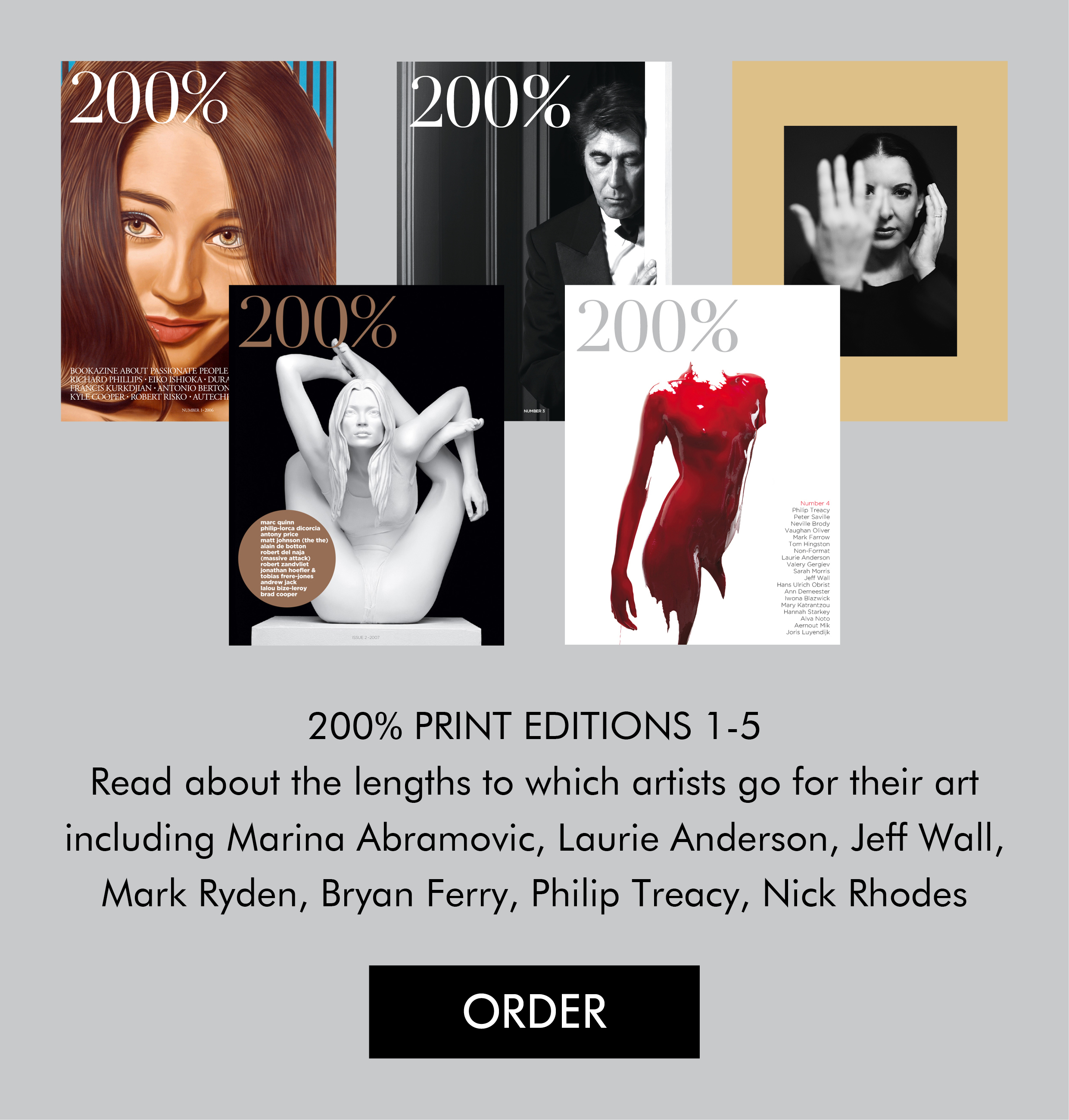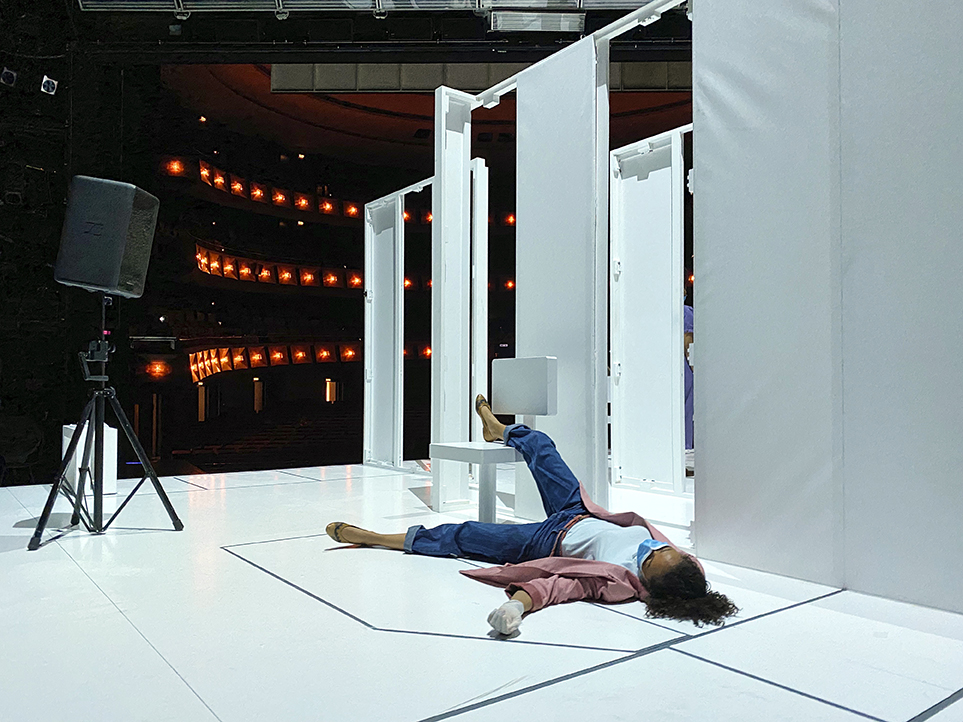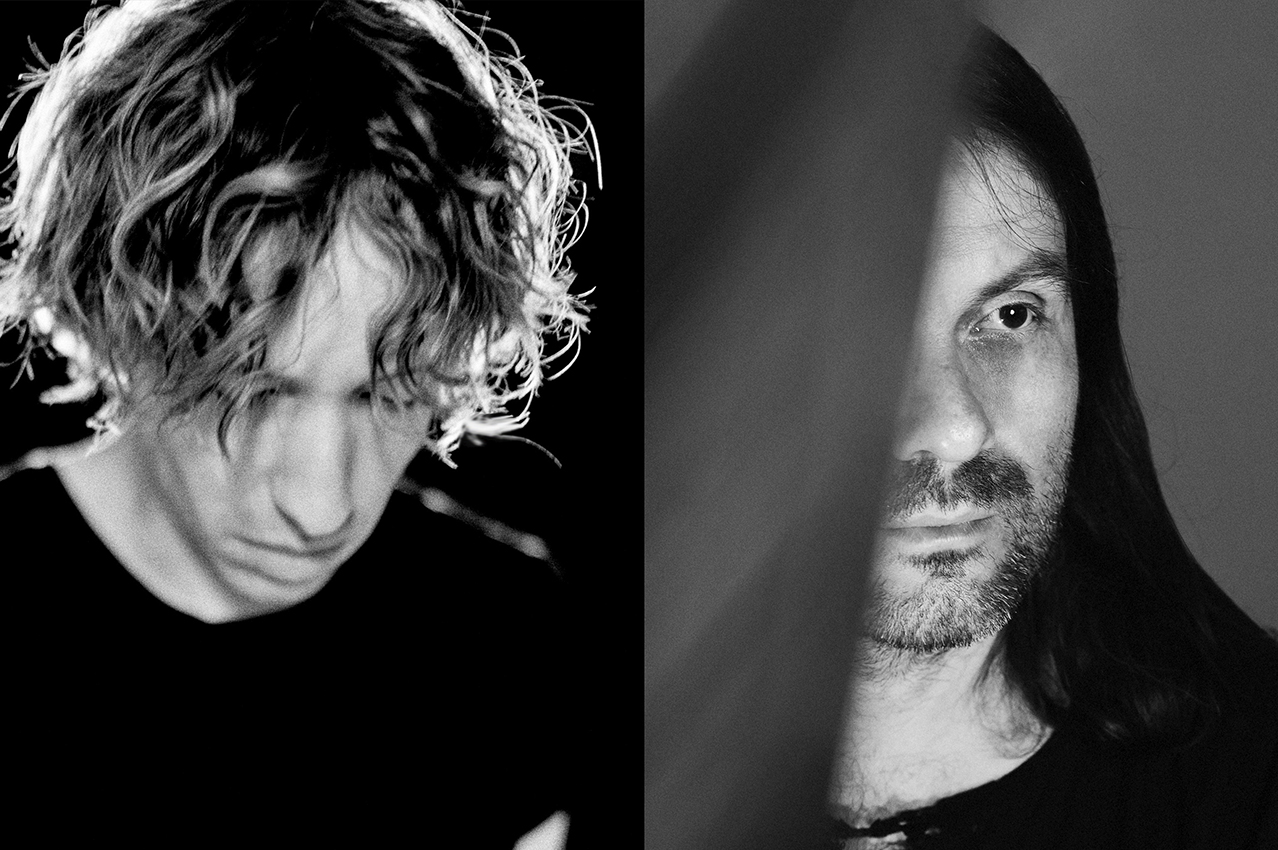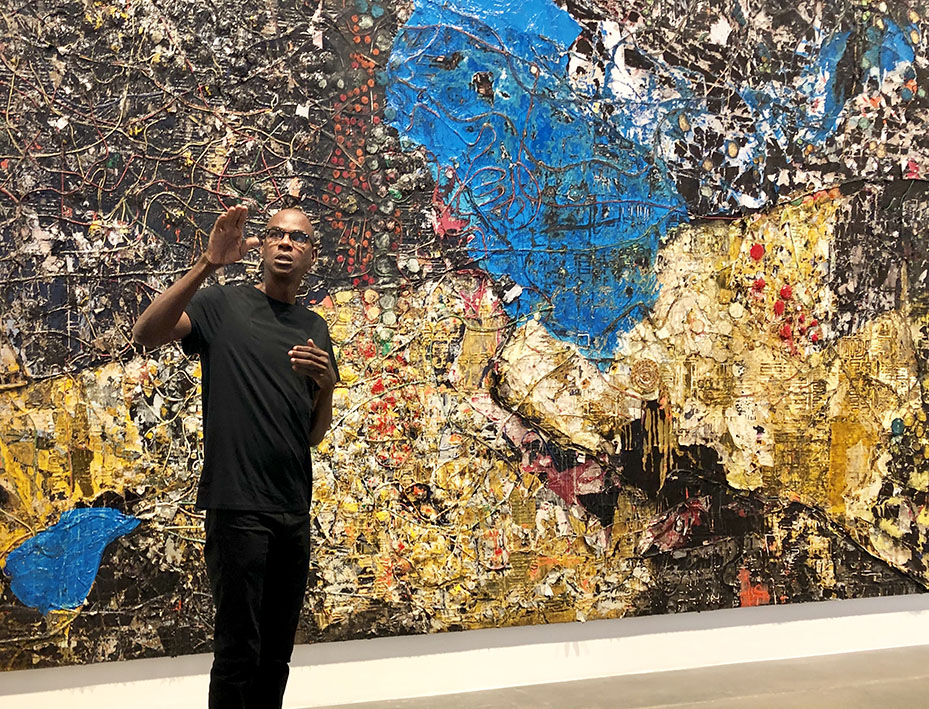 It’s quite rare in pop music that a song performed at a live concert is prefaced with these words: “This is a brand new song; the lyrics are not yet finished, but the wisest and most discerning amongst you will detect some theories of Richard Rorty and Immanuel Kant in there”. These words, spoken by Green Gartside, the frontman of Scritti Politti, didn’t alienate the audience but made them burst into laughter as they did not expect that the band’s lyrics to be without references to philosophers.
Art schools, especially in the UK, have always been successful breeding grounds for musical talent. Syd Barrett, David Bowie, Brian Eno and John Lennon all attended art schools, a contributing factor to their left-wing, independent, unconfined and socially engaged thinking as they were exposed to fundamental questions about life and death. The school libraries were not only filled with books on art but also by works of literature, poetry and philosophy, which can be invigorating sources for potential songwriters.
Bryan Ferry studied fine art at the University of Newcastle-upon-Tyne and quoted Friedrich Nietzsche’s famous book in the Roxy Music song ‘Mother of Pearl’; “Thus, even Zarathustra / Another time loser / Could believe in you”. In the song ‘There is a Kingdom’, Nick Cave, who studied painting at the Caulfield Institute of Technology, cites Immanuel Kant: ‘The starry heavens above us and the moral law within’.
Jon King, singer of the post-punk group Gang of Four was a student of Fine Art at the University of Leeds. The band’s song ‘Damaged Goods’ was infused by the ideas of the German philosopher Karl Marx: “Open the till/Give me the change/You said would do me good/Refund the cost/You said you’re cheap but you’re too much”.
Nine out of ten times the subject of pop lyrics is about love, rebellion, sorrow, loss and, of course, sex, which has been explored most notably with witty suggestive references in the lyrics by David Bowie, Led Zeppelin and Prince. Jon King asked the legitimate question in an article in the New York Times, “Why not write about ideas?”
Green Gartside (original name Paul Julian Strohmeyer) studied at Leeds College of Art and is listed as a notable alumni of the College, together with Damien Hirst and Henry Moore. The Welsh born singer-songwriter derived the band’s name from ‘Scritti Politici’ – the political writings from 1910-1920 by the Italian Marxist theorist Antonio Gramsci. Gartside made the name of the band more ‘charts friendly’ by changing the last part into Politti.
On their debut album, ‘Songs to Remember’, one of the songs is called ‘Jacques Derrida’, after the French philosopher who introduced the term deconstruction in his book ‘Of Grammatology’. The title of the song is an explicit homage to the use of philosophy in Scritti Politti’s lyrics and in ‘The Sweetest Girl’ there is another reference to the Frenchman’s ideas with the line: “The strongest words in each belief/To find out what’s behind it”.Ideas and theories of other philosophers such as Jacques Lacan, Julia Kristeva, Michel Foucault can also be found in Scritti Politti’s lyrics.
As a lyricist deals with language and communication he consults sources such as the Thesaurus and rhyme books, but Gartside also studied the ideas of language philosopher Ludwig Wittgenstein whose ideas are also interwoven into lyrics of Scritti Politti’s biggest UK hit ‘The Word Girl’.
It might be a coincidence, but an explanation as to why some of Scritti Politti’s song titles make reference to communication such as ‘The Word Girl’, ‘Small Talk’ and ‘Bibbly-O-Tek’ – a derivation of the French word for library, Bibliothèque.
What can embedding of philosophy in pop lyrics bring to the table? As a medium, pop music has an enormous potential to reach millions of people around the globe. A meaningful song can move people with different ethnicity and cultural backgrounds. The ‘language’ of pop music is therefore universal. Philosophy addresses the ‘Big Questions’ of life such as the ‘Meaning of Life’ – why are we here? – and can be regarded as an attempt to clarify, and find answers to these type of questions. It would be of no harm to imbue some ideas and theories of philosophers into the UK Top 40 singles Chart or the Billboard Top 100, wouldn’t it?
In this first part of our interview with Gartside we discussed what inspired him to infuse philosophers’ ideas into the lyrics of Scritti Politti, whether he considered it may be regarded as pretentious, and if there is a certain freedom in terms of writing song lyrics that other forms of writing can’t offer?
200%: In early days, Scritti Politti, was a band-as-commune consisting of musicians and non-musicians. Musicians within a group were selected by an audition. How did it work with the non-musicians? Did they also have to have some sort of audition?
Green Gartside: No, it was just people that we met. Once the word got around, there would be people who would just come and find us in our squat in Camden Town. People would just come and knock on the door and they would be from Britain, Europe and the door would always be open to them. They would always be welcomed and they would always have some interesting things to report or things to about which to talk, for instance, what they heard on independent pirate radio station in Italy. Or people that we met at university, various functions, gigs, record stores or bookstores. It was a very lively group of people.
200%: What was the role and contribution of these non-musicians who, at a certain point, outnumbered the musicians in the band?
GG: At that time we were part of an extended group of young communists and socialists. The role of the non-musicians was to provide input into our discussions about politics, cultural and critical theory. A lot of talk was about the times of punk, and ideas and theories of people like Antonio Gramsci and Karl Marx. I guess the music in a way arose from these discussions that we had amongst this group of people. We would stay up all day or night, do a lot of speed and talk a lot of theory. People would come with new records from Jamaica or America which we played and then discussed them. That’s how these people were contributing and were part of the process.
200%: From these discussion it made sense that you were inspired to infuse Neo-Marxist theory of Antonio Gramsci and philosophical ideas of Ludwig Wittgenstein, Immanuel Kant into the lyrics of Scritti Politti?
GG: Yes, it was. When you write a song you inevitably write about what you have been reading, thinking or talking about which finds its way into your lyrics to one extent or another. My ideas from theory have always ended up in my lyrics as that’s been a constant throughout my mind, ever since I was a teenager having an interest in philosophy and theory – it’s a huge part of my life.
200%: Did you consider it might be highfalutin or even pretentious to infuse philosophers’ ideas into your lyrics?
GG: I have never been afraid of pretention. I think a better word is aspiration as pretention has a sense of dishonesty to me. It was just genuine aspiration. It didn’t seem uncomfortable to me. Sometimes, looking back, I’m sure a lot of attempts at songs were very tosh, unsuccessful – they make me uncomfortable to listen to them now. These ideas inevitably found their way into the music. I’m not sure, though, at that time, that I was fully aware that there would be a limited audience for the sets of references that we put in the lyrics.
200%: The lyrics of ‘The Sweetest Girl’ were inspired by ideas of the French philosopher Jacques Derrida. Have the ideas of philosophers been more subtly interwoven into the lyrics on the ‘Cupid & Psyche’ album?
GG: Yes, they were. ‘The Word Girl’ lyrics are about the language in pop music, for example, the ubiquity of the word ‘girl’ in pop music, its reasons of meaning, its emptying out of meaning. The lyrics are filled with references to the ideas of Ludwig Wittgenstein and Julia Kristeva. There came a point, though, about the end of the ‘Provision’ album, that I became fed up with the whole post modern philosophy; Baudrillard, Léotard, Derrida, Foucault etc. At the same time I also became fed up with pop music and I was only interested in hip hop and trying to go back to basic questions of Epistemology. I was fed up with the whole Postmodern and Post-structuralism tradition. I’m kind of revisiting it now.
200%: In terms of writing, is there a certain freedom that song lyrics can offer that other forms of writing for instance literature, poetry, or essays can’t offer?
GG: I don’t imagine that there is a freedom afforded to pop verses that poetry doesn’t has. There is a history of poetry that in some ways is overbearing and with pop music it’s a place where you can explore the banal. Pop music is also a place where it argues that desire can erupt through language. The greatest pop lyrics are the points where the language stops making sense in a way, for instance Little Richard’s ‘Tutti Frutti’. Pop music is the place where you can do that.
Interview written and conducted by Thierry Somers with a contribution by Marcel Harlaar
Picture: Green Gartside at Bush Hall, Screen dump of the set-list of the Bush Hall concert (21 April) provided by Rhodri Marsden, the keyboard player of Scritti Politti.
In the second part of our interview with Gartside we’ll discuss the consequences of the transformation of Scritti Politti from a band that is making ‘marginal’ music to mainstream pop music and the new album to be released later this year.
LEAVE A COMMENT:
Please tell us of any pop musicians whom you know who also infused ideas of philosophers into their lyrics.
It’s quite rare in pop music that a song performed at a live concert is prefaced with these words: “This is a brand new song; the lyrics are not yet finished, but the wisest and most discerning amongst you will detect some theories of Richard Rorty and Immanuel Kant in there”. These words, spoken by Green Gartside, the frontman of Scritti Politti, didn’t alienate the audience but made them burst into laughter as they did not expect that the band’s lyrics to be without references to philosophers.
Art schools, especially in the UK, have always been successful breeding grounds for musical talent. Syd Barrett, David Bowie, Brian Eno and John Lennon all attended art schools, a contributing factor to their left-wing, independent, unconfined and socially engaged thinking as they were exposed to fundamental questions about life and death. The school libraries were not only filled with books on art but also by works of literature, poetry and philosophy, which can be invigorating sources for potential songwriters.
Bryan Ferry studied fine art at the University of Newcastle-upon-Tyne and quoted Friedrich Nietzsche’s famous book in the Roxy Music song ‘Mother of Pearl’; “Thus, even Zarathustra / Another time loser / Could believe in you”. In the song ‘There is a Kingdom’, Nick Cave, who studied painting at the Caulfield Institute of Technology, cites Immanuel Kant: ‘The starry heavens above us and the moral law within’.
Jon King, singer of the post-punk group Gang of Four was a student of Fine Art at the University of Leeds. The band’s song ‘Damaged Goods’ was infused by the ideas of the German philosopher Karl Marx: “Open the till/Give me the change/You said would do me good/Refund the cost/You said you’re cheap but you’re too much”.
Nine out of ten times the subject of pop lyrics is about love, rebellion, sorrow, loss and, of course, sex, which has been explored most notably with witty suggestive references in the lyrics by David Bowie, Led Zeppelin and Prince. Jon King asked the legitimate question in an article in the New York Times, “Why not write about ideas?”
Green Gartside (original name Paul Julian Strohmeyer) studied at Leeds College of Art and is listed as a notable alumni of the College, together with Damien Hirst and Henry Moore. The Welsh born singer-songwriter derived the band’s name from ‘Scritti Politici’ – the political writings from 1910-1920 by the Italian Marxist theorist Antonio Gramsci. Gartside made the name of the band more ‘charts friendly’ by changing the last part into Politti.
On their debut album, ‘Songs to Remember’, one of the songs is called ‘Jacques Derrida’, after the French philosopher who introduced the term deconstruction in his book ‘Of Grammatology’. The title of the song is an explicit homage to the use of philosophy in Scritti Politti’s lyrics and in ‘The Sweetest Girl’ there is another reference to the Frenchman’s ideas with the line: “The strongest words in each belief/To find out what’s behind it”.Ideas and theories of other philosophers such as Jacques Lacan, Julia Kristeva, Michel Foucault can also be found in Scritti Politti’s lyrics.
As a lyricist deals with language and communication he consults sources such as the Thesaurus and rhyme books, but Gartside also studied the ideas of language philosopher Ludwig Wittgenstein whose ideas are also interwoven into lyrics of Scritti Politti’s biggest UK hit ‘The Word Girl’.
It might be a coincidence, but an explanation as to why some of Scritti Politti’s song titles make reference to communication such as ‘The Word Girl’, ‘Small Talk’ and ‘Bibbly-O-Tek’ – a derivation of the French word for library, Bibliothèque.
What can embedding of philosophy in pop lyrics bring to the table? As a medium, pop music has an enormous potential to reach millions of people around the globe. A meaningful song can move people with different ethnicity and cultural backgrounds. The ‘language’ of pop music is therefore universal. Philosophy addresses the ‘Big Questions’ of life such as the ‘Meaning of Life’ – why are we here? – and can be regarded as an attempt to clarify, and find answers to these type of questions. It would be of no harm to imbue some ideas and theories of philosophers into the UK Top 40 singles Chart or the Billboard Top 100, wouldn’t it?
In this first part of our interview with Gartside we discussed what inspired him to infuse philosophers’ ideas into the lyrics of Scritti Politti, whether he considered it may be regarded as pretentious, and if there is a certain freedom in terms of writing song lyrics that other forms of writing can’t offer?
200%: In early days, Scritti Politti, was a band-as-commune consisting of musicians and non-musicians. Musicians within a group were selected by an audition. How did it work with the non-musicians? Did they also have to have some sort of audition?
Green Gartside: No, it was just people that we met. Once the word got around, there would be people who would just come and find us in our squat in Camden Town. People would just come and knock on the door and they would be from Britain, Europe and the door would always be open to them. They would always be welcomed and they would always have some interesting things to report or things to about which to talk, for instance, what they heard on independent pirate radio station in Italy. Or people that we met at university, various functions, gigs, record stores or bookstores. It was a very lively group of people.
200%: What was the role and contribution of these non-musicians who, at a certain point, outnumbered the musicians in the band?
GG: At that time we were part of an extended group of young communists and socialists. The role of the non-musicians was to provide input into our discussions about politics, cultural and critical theory. A lot of talk was about the times of punk, and ideas and theories of people like Antonio Gramsci and Karl Marx. I guess the music in a way arose from these discussions that we had amongst this group of people. We would stay up all day or night, do a lot of speed and talk a lot of theory. People would come with new records from Jamaica or America which we played and then discussed them. That’s how these people were contributing and were part of the process.
200%: From these discussion it made sense that you were inspired to infuse Neo-Marxist theory of Antonio Gramsci and philosophical ideas of Ludwig Wittgenstein, Immanuel Kant into the lyrics of Scritti Politti?
GG: Yes, it was. When you write a song you inevitably write about what you have been reading, thinking or talking about which finds its way into your lyrics to one extent or another. My ideas from theory have always ended up in my lyrics as that’s been a constant throughout my mind, ever since I was a teenager having an interest in philosophy and theory – it’s a huge part of my life.
200%: Did you consider it might be highfalutin or even pretentious to infuse philosophers’ ideas into your lyrics?
GG: I have never been afraid of pretention. I think a better word is aspiration as pretention has a sense of dishonesty to me. It was just genuine aspiration. It didn’t seem uncomfortable to me. Sometimes, looking back, I’m sure a lot of attempts at songs were very tosh, unsuccessful – they make me uncomfortable to listen to them now. These ideas inevitably found their way into the music. I’m not sure, though, at that time, that I was fully aware that there would be a limited audience for the sets of references that we put in the lyrics.
200%: The lyrics of ‘The Sweetest Girl’ were inspired by ideas of the French philosopher Jacques Derrida. Have the ideas of philosophers been more subtly interwoven into the lyrics on the ‘Cupid & Psyche’ album?
GG: Yes, they were. ‘The Word Girl’ lyrics are about the language in pop music, for example, the ubiquity of the word ‘girl’ in pop music, its reasons of meaning, its emptying out of meaning. The lyrics are filled with references to the ideas of Ludwig Wittgenstein and Julia Kristeva. There came a point, though, about the end of the ‘Provision’ album, that I became fed up with the whole post modern philosophy; Baudrillard, Léotard, Derrida, Foucault etc. At the same time I also became fed up with pop music and I was only interested in hip hop and trying to go back to basic questions of Epistemology. I was fed up with the whole Postmodern and Post-structuralism tradition. I’m kind of revisiting it now.
200%: In terms of writing, is there a certain freedom that song lyrics can offer that other forms of writing for instance literature, poetry, or essays can’t offer?
GG: I don’t imagine that there is a freedom afforded to pop verses that poetry doesn’t has. There is a history of poetry that in some ways is overbearing and with pop music it’s a place where you can explore the banal. Pop music is also a place where it argues that desire can erupt through language. The greatest pop lyrics are the points where the language stops making sense in a way, for instance Little Richard’s ‘Tutti Frutti’. Pop music is the place where you can do that.
Interview written and conducted by Thierry Somers with a contribution by Marcel Harlaar
Picture: Green Gartside at Bush Hall, Screen dump of the set-list of the Bush Hall concert (21 April) provided by Rhodri Marsden, the keyboard player of Scritti Politti.
In the second part of our interview with Gartside we’ll discuss the consequences of the transformation of Scritti Politti from a band that is making ‘marginal’ music to mainstream pop music and the new album to be released later this year.
LEAVE A COMMENT:
Please tell us of any pop musicians whom you know who also infused ideas of philosophers into their lyrics.
 It’s quite rare in pop music that a song performed at a live concert is prefaced with these words: “This is a brand new song; the lyrics are not yet finished, but the wisest and most discerning amongst you will detect some theories of Richard Rorty and Immanuel Kant in there”. These words, spoken by Green Gartside, the frontman of Scritti Politti, didn’t alienate the audience but made them burst into laughter as they did not expect that the band’s lyrics to be without references to philosophers.
Art schools, especially in the UK, have always been successful breeding grounds for musical talent. Syd Barrett, David Bowie, Brian Eno and John Lennon all attended art schools, a contributing factor to their left-wing, independent, unconfined and socially engaged thinking as they were exposed to fundamental questions about life and death. The school libraries were not only filled with books on art but also by works of literature, poetry and philosophy, which can be invigorating sources for potential songwriters.
Bryan Ferry studied fine art at the University of Newcastle-upon-Tyne and quoted Friedrich Nietzsche’s famous book in the Roxy Music song ‘Mother of Pearl’; “Thus, even Zarathustra / Another time loser / Could believe in you”. In the song ‘There is a Kingdom’, Nick Cave, who studied painting at the Caulfield Institute of Technology, cites Immanuel Kant: ‘The starry heavens above us and the moral law within’.
Jon King, singer of the post-punk group Gang of Four was a student of Fine Art at the University of Leeds. The band’s song ‘Damaged Goods’ was infused by the ideas of the German philosopher Karl Marx: “Open the till/Give me the change/You said would do me good/Refund the cost/You said you’re cheap but you’re too much”.
Nine out of ten times the subject of pop lyrics is about love, rebellion, sorrow, loss and, of course, sex, which has been explored most notably with witty suggestive references in the lyrics by David Bowie, Led Zeppelin and Prince. Jon King asked the legitimate question in an article in the New York Times, “Why not write about ideas?”
Green Gartside (original name Paul Julian Strohmeyer) studied at Leeds College of Art and is listed as a notable alumni of the College, together with Damien Hirst and Henry Moore. The Welsh born singer-songwriter derived the band’s name from ‘Scritti Politici’ – the political writings from 1910-1920 by the Italian Marxist theorist Antonio Gramsci. Gartside made the name of the band more ‘charts friendly’ by changing the last part into Politti.
On their debut album, ‘Songs to Remember’, one of the songs is called ‘Jacques Derrida’, after the French philosopher who introduced the term deconstruction in his book ‘Of Grammatology’. The title of the song is an explicit homage to the use of philosophy in Scritti Politti’s lyrics and in ‘The Sweetest Girl’ there is another reference to the Frenchman’s ideas with the line: “The strongest words in each belief/To find out what’s behind it”.Ideas and theories of other philosophers such as Jacques Lacan, Julia Kristeva, Michel Foucault can also be found in Scritti Politti’s lyrics.
As a lyricist deals with language and communication he consults sources such as the Thesaurus and rhyme books, but Gartside also studied the ideas of language philosopher Ludwig Wittgenstein whose ideas are also interwoven into lyrics of Scritti Politti’s biggest UK hit ‘The Word Girl’.
It might be a coincidence, but an explanation as to why some of Scritti Politti’s song titles make reference to communication such as ‘The Word Girl’, ‘Small Talk’ and ‘Bibbly-O-Tek’ – a derivation of the French word for library, Bibliothèque.
What can embedding of philosophy in pop lyrics bring to the table? As a medium, pop music has an enormous potential to reach millions of people around the globe. A meaningful song can move people with different ethnicity and cultural backgrounds. The ‘language’ of pop music is therefore universal. Philosophy addresses the ‘Big Questions’ of life such as the ‘Meaning of Life’ – why are we here? – and can be regarded as an attempt to clarify, and find answers to these type of questions. It would be of no harm to imbue some ideas and theories of philosophers into the UK Top 40 singles Chart or the Billboard Top 100, wouldn’t it?
In this first part of our interview with Gartside we discussed what inspired him to infuse philosophers’ ideas into the lyrics of Scritti Politti, whether he considered it may be regarded as pretentious, and if there is a certain freedom in terms of writing song lyrics that other forms of writing can’t offer?
200%: In early days, Scritti Politti, was a band-as-commune consisting of musicians and non-musicians. Musicians within a group were selected by an audition. How did it work with the non-musicians? Did they also have to have some sort of audition?
Green Gartside: No, it was just people that we met. Once the word got around, there would be people who would just come and find us in our squat in Camden Town. People would just come and knock on the door and they would be from Britain, Europe and the door would always be open to them. They would always be welcomed and they would always have some interesting things to report or things to about which to talk, for instance, what they heard on independent pirate radio station in Italy. Or people that we met at university, various functions, gigs, record stores or bookstores. It was a very lively group of people.
200%: What was the role and contribution of these non-musicians who, at a certain point, outnumbered the musicians in the band?
GG: At that time we were part of an extended group of young communists and socialists. The role of the non-musicians was to provide input into our discussions about politics, cultural and critical theory. A lot of talk was about the times of punk, and ideas and theories of people like Antonio Gramsci and Karl Marx. I guess the music in a way arose from these discussions that we had amongst this group of people. We would stay up all day or night, do a lot of speed and talk a lot of theory. People would come with new records from Jamaica or America which we played and then discussed them. That’s how these people were contributing and were part of the process.
200%: From these discussion it made sense that you were inspired to infuse Neo-Marxist theory of Antonio Gramsci and philosophical ideas of Ludwig Wittgenstein, Immanuel Kant into the lyrics of Scritti Politti?
GG: Yes, it was. When you write a song you inevitably write about what you have been reading, thinking or talking about which finds its way into your lyrics to one extent or another. My ideas from theory have always ended up in my lyrics as that’s been a constant throughout my mind, ever since I was a teenager having an interest in philosophy and theory – it’s a huge part of my life.
200%: Did you consider it might be highfalutin or even pretentious to infuse philosophers’ ideas into your lyrics?
GG: I have never been afraid of pretention. I think a better word is aspiration as pretention has a sense of dishonesty to me. It was just genuine aspiration. It didn’t seem uncomfortable to me. Sometimes, looking back, I’m sure a lot of attempts at songs were very tosh, unsuccessful – they make me uncomfortable to listen to them now. These ideas inevitably found their way into the music. I’m not sure, though, at that time, that I was fully aware that there would be a limited audience for the sets of references that we put in the lyrics.
200%: The lyrics of ‘The Sweetest Girl’ were inspired by ideas of the French philosopher Jacques Derrida. Have the ideas of philosophers been more subtly interwoven into the lyrics on the ‘Cupid & Psyche’ album?
GG: Yes, they were. ‘The Word Girl’ lyrics are about the language in pop music, for example, the ubiquity of the word ‘girl’ in pop music, its reasons of meaning, its emptying out of meaning. The lyrics are filled with references to the ideas of Ludwig Wittgenstein and Julia Kristeva. There came a point, though, about the end of the ‘Provision’ album, that I became fed up with the whole post modern philosophy; Baudrillard, Léotard, Derrida, Foucault etc. At the same time I also became fed up with pop music and I was only interested in hip hop and trying to go back to basic questions of Epistemology. I was fed up with the whole Postmodern and Post-structuralism tradition. I’m kind of revisiting it now.
200%: In terms of writing, is there a certain freedom that song lyrics can offer that other forms of writing for instance literature, poetry, or essays can’t offer?
GG: I don’t imagine that there is a freedom afforded to pop verses that poetry doesn’t has. There is a history of poetry that in some ways is overbearing and with pop music it’s a place where you can explore the banal. Pop music is also a place where it argues that desire can erupt through language. The greatest pop lyrics are the points where the language stops making sense in a way, for instance Little Richard’s ‘Tutti Frutti’. Pop music is the place where you can do that.
Interview written and conducted by Thierry Somers with a contribution by Marcel Harlaar
Picture: Green Gartside at Bush Hall, Screen dump of the set-list of the Bush Hall concert (21 April) provided by Rhodri Marsden, the keyboard player of Scritti Politti.
In the second part of our interview with Gartside we’ll discuss the consequences of the transformation of Scritti Politti from a band that is making ‘marginal’ music to mainstream pop music and the new album to be released later this year.
LEAVE A COMMENT:
Please tell us of any pop musicians whom you know who also infused ideas of philosophers into their lyrics.
It’s quite rare in pop music that a song performed at a live concert is prefaced with these words: “This is a brand new song; the lyrics are not yet finished, but the wisest and most discerning amongst you will detect some theories of Richard Rorty and Immanuel Kant in there”. These words, spoken by Green Gartside, the frontman of Scritti Politti, didn’t alienate the audience but made them burst into laughter as they did not expect that the band’s lyrics to be without references to philosophers.
Art schools, especially in the UK, have always been successful breeding grounds for musical talent. Syd Barrett, David Bowie, Brian Eno and John Lennon all attended art schools, a contributing factor to their left-wing, independent, unconfined and socially engaged thinking as they were exposed to fundamental questions about life and death. The school libraries were not only filled with books on art but also by works of literature, poetry and philosophy, which can be invigorating sources for potential songwriters.
Bryan Ferry studied fine art at the University of Newcastle-upon-Tyne and quoted Friedrich Nietzsche’s famous book in the Roxy Music song ‘Mother of Pearl’; “Thus, even Zarathustra / Another time loser / Could believe in you”. In the song ‘There is a Kingdom’, Nick Cave, who studied painting at the Caulfield Institute of Technology, cites Immanuel Kant: ‘The starry heavens above us and the moral law within’.
Jon King, singer of the post-punk group Gang of Four was a student of Fine Art at the University of Leeds. The band’s song ‘Damaged Goods’ was infused by the ideas of the German philosopher Karl Marx: “Open the till/Give me the change/You said would do me good/Refund the cost/You said you’re cheap but you’re too much”.
Nine out of ten times the subject of pop lyrics is about love, rebellion, sorrow, loss and, of course, sex, which has been explored most notably with witty suggestive references in the lyrics by David Bowie, Led Zeppelin and Prince. Jon King asked the legitimate question in an article in the New York Times, “Why not write about ideas?”
Green Gartside (original name Paul Julian Strohmeyer) studied at Leeds College of Art and is listed as a notable alumni of the College, together with Damien Hirst and Henry Moore. The Welsh born singer-songwriter derived the band’s name from ‘Scritti Politici’ – the political writings from 1910-1920 by the Italian Marxist theorist Antonio Gramsci. Gartside made the name of the band more ‘charts friendly’ by changing the last part into Politti.
On their debut album, ‘Songs to Remember’, one of the songs is called ‘Jacques Derrida’, after the French philosopher who introduced the term deconstruction in his book ‘Of Grammatology’. The title of the song is an explicit homage to the use of philosophy in Scritti Politti’s lyrics and in ‘The Sweetest Girl’ there is another reference to the Frenchman’s ideas with the line: “The strongest words in each belief/To find out what’s behind it”.Ideas and theories of other philosophers such as Jacques Lacan, Julia Kristeva, Michel Foucault can also be found in Scritti Politti’s lyrics.
As a lyricist deals with language and communication he consults sources such as the Thesaurus and rhyme books, but Gartside also studied the ideas of language philosopher Ludwig Wittgenstein whose ideas are also interwoven into lyrics of Scritti Politti’s biggest UK hit ‘The Word Girl’.
It might be a coincidence, but an explanation as to why some of Scritti Politti’s song titles make reference to communication such as ‘The Word Girl’, ‘Small Talk’ and ‘Bibbly-O-Tek’ – a derivation of the French word for library, Bibliothèque.
What can embedding of philosophy in pop lyrics bring to the table? As a medium, pop music has an enormous potential to reach millions of people around the globe. A meaningful song can move people with different ethnicity and cultural backgrounds. The ‘language’ of pop music is therefore universal. Philosophy addresses the ‘Big Questions’ of life such as the ‘Meaning of Life’ – why are we here? – and can be regarded as an attempt to clarify, and find answers to these type of questions. It would be of no harm to imbue some ideas and theories of philosophers into the UK Top 40 singles Chart or the Billboard Top 100, wouldn’t it?
In this first part of our interview with Gartside we discussed what inspired him to infuse philosophers’ ideas into the lyrics of Scritti Politti, whether he considered it may be regarded as pretentious, and if there is a certain freedom in terms of writing song lyrics that other forms of writing can’t offer?
200%: In early days, Scritti Politti, was a band-as-commune consisting of musicians and non-musicians. Musicians within a group were selected by an audition. How did it work with the non-musicians? Did they also have to have some sort of audition?
Green Gartside: No, it was just people that we met. Once the word got around, there would be people who would just come and find us in our squat in Camden Town. People would just come and knock on the door and they would be from Britain, Europe and the door would always be open to them. They would always be welcomed and they would always have some interesting things to report or things to about which to talk, for instance, what they heard on independent pirate radio station in Italy. Or people that we met at university, various functions, gigs, record stores or bookstores. It was a very lively group of people.
200%: What was the role and contribution of these non-musicians who, at a certain point, outnumbered the musicians in the band?
GG: At that time we were part of an extended group of young communists and socialists. The role of the non-musicians was to provide input into our discussions about politics, cultural and critical theory. A lot of talk was about the times of punk, and ideas and theories of people like Antonio Gramsci and Karl Marx. I guess the music in a way arose from these discussions that we had amongst this group of people. We would stay up all day or night, do a lot of speed and talk a lot of theory. People would come with new records from Jamaica or America which we played and then discussed them. That’s how these people were contributing and were part of the process.
200%: From these discussion it made sense that you were inspired to infuse Neo-Marxist theory of Antonio Gramsci and philosophical ideas of Ludwig Wittgenstein, Immanuel Kant into the lyrics of Scritti Politti?
GG: Yes, it was. When you write a song you inevitably write about what you have been reading, thinking or talking about which finds its way into your lyrics to one extent or another. My ideas from theory have always ended up in my lyrics as that’s been a constant throughout my mind, ever since I was a teenager having an interest in philosophy and theory – it’s a huge part of my life.
200%: Did you consider it might be highfalutin or even pretentious to infuse philosophers’ ideas into your lyrics?
GG: I have never been afraid of pretention. I think a better word is aspiration as pretention has a sense of dishonesty to me. It was just genuine aspiration. It didn’t seem uncomfortable to me. Sometimes, looking back, I’m sure a lot of attempts at songs were very tosh, unsuccessful – they make me uncomfortable to listen to them now. These ideas inevitably found their way into the music. I’m not sure, though, at that time, that I was fully aware that there would be a limited audience for the sets of references that we put in the lyrics.
200%: The lyrics of ‘The Sweetest Girl’ were inspired by ideas of the French philosopher Jacques Derrida. Have the ideas of philosophers been more subtly interwoven into the lyrics on the ‘Cupid & Psyche’ album?
GG: Yes, they were. ‘The Word Girl’ lyrics are about the language in pop music, for example, the ubiquity of the word ‘girl’ in pop music, its reasons of meaning, its emptying out of meaning. The lyrics are filled with references to the ideas of Ludwig Wittgenstein and Julia Kristeva. There came a point, though, about the end of the ‘Provision’ album, that I became fed up with the whole post modern philosophy; Baudrillard, Léotard, Derrida, Foucault etc. At the same time I also became fed up with pop music and I was only interested in hip hop and trying to go back to basic questions of Epistemology. I was fed up with the whole Postmodern and Post-structuralism tradition. I’m kind of revisiting it now.
200%: In terms of writing, is there a certain freedom that song lyrics can offer that other forms of writing for instance literature, poetry, or essays can’t offer?
GG: I don’t imagine that there is a freedom afforded to pop verses that poetry doesn’t has. There is a history of poetry that in some ways is overbearing and with pop music it’s a place where you can explore the banal. Pop music is also a place where it argues that desire can erupt through language. The greatest pop lyrics are the points where the language stops making sense in a way, for instance Little Richard’s ‘Tutti Frutti’. Pop music is the place where you can do that.
Interview written and conducted by Thierry Somers with a contribution by Marcel Harlaar
Picture: Green Gartside at Bush Hall, Screen dump of the set-list of the Bush Hall concert (21 April) provided by Rhodri Marsden, the keyboard player of Scritti Politti.
In the second part of our interview with Gartside we’ll discuss the consequences of the transformation of Scritti Politti from a band that is making ‘marginal’ music to mainstream pop music and the new album to be released later this year.
LEAVE A COMMENT:
Please tell us of any pop musicians whom you know who also infused ideas of philosophers into their lyrics.










